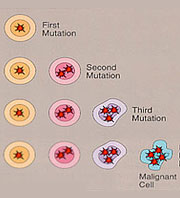Adventures in Genetic Testing
Neille Ilel
MAY 12, 2007
Listen to this Story

- The cancer blobs. When a woman has a mutation ...
- (Joyce Seldon)
- View the Slideshow
Web Resources
- A Jewish Girl's Guide to Genetic Testing (Part One)
- Genetic Testing for BRCA1 and BRCA2
- The UCLA Family Cancer Registry
Related Stories
More From Neille Ilel
Excerpt from "A Jewish Girl's Guide to Genetic Testing" by Neille Ilel
Later this month, my mother is going to have her breasts removed, not because she has cancer, but because she's quite sure she'll get it. It's not the first time she's had body parts removed. In fact, I'd had my mother pegged as straight-up insane since I was 12, when she underwent a total hysterectomy at age 35. It took me years to realize she's not crazy. Or at least not that crazy. Finally, last year, we made The Deal: I told her I would get tested for the breast cancer gene if she would go into therapy.
When my mother first told me about the "cancer gene," maybe five years ago, I didn't believe her. I remember sitting on the phone with her in my Brooklyn kitchen, rolling my eyes, and probably smoking a cigarette. I'd been on the receiving end of too many articles about cancer prevention to take this to heart. But it turned out my mother wasn't lying that day. And it also turned out that the feeling she had of being cursed, the feeling that made me think she was insane for so long, was right. Cancer is in her genes.
Today scientists have isolated mutations on several breast and ovarian cancer-causing genes, with more being discovered regularly. It's now possible to get a test for the "breast cancer gene," or mutations in BRCA1 and BRCA2, named, creatively enough, after Breast Cancer 1 and 2. If a woman has this mutation, the probability she'll develop ovarian or breast cancer skyrockets. The statistics vary, but if you have the gene you are far more likely to get cancer than to live a long life without it.
Part of me thinks it was better when we thought cancer was arbitrary. Sure, spending your life in a coal mine or smoking cigarettes was bound to make a person sick, but otherwise it was random and illogical--or at least unknowable. Like getting hit by a bus. But as genetics advances, it's likely that we will soon know about lots of illnesses to which we're predisposed. The medicine won't necessarily keep up, though. And the thing with ovarian cancer is that by the time it's detected--because ovaries are so small--it's almost always too late. In any case, a predisposition is not a diagnosis. What's so great about knowing? So that you can strategically plan when to have kids? And then plan which organs to remove when?
>> Read the full story at Jewcy.com
-
- Music Bridge:
- Air a Danser
- Artist: Penguin Cafe Orchestra
- CD: "Oskar und Leni" (Editions Eg Records)







Comments
Comment | Refresh
Post a Comment: Please be civil, brief and relevant.
Email addresses are never displayed, but they are required to confirm your comments. All comments are moderated. Weekend America reserves the right to edit any comments on this site and to read them on the air if they are extra-interesting. Please read the Comment Guidelines before posting.
You must be 13 or over to submit information to American Public Media. The information entered into this form will not be used to send unsolicited email and will not be sold to a third party. For more information see Terms and Conditions and Privacy Policy.